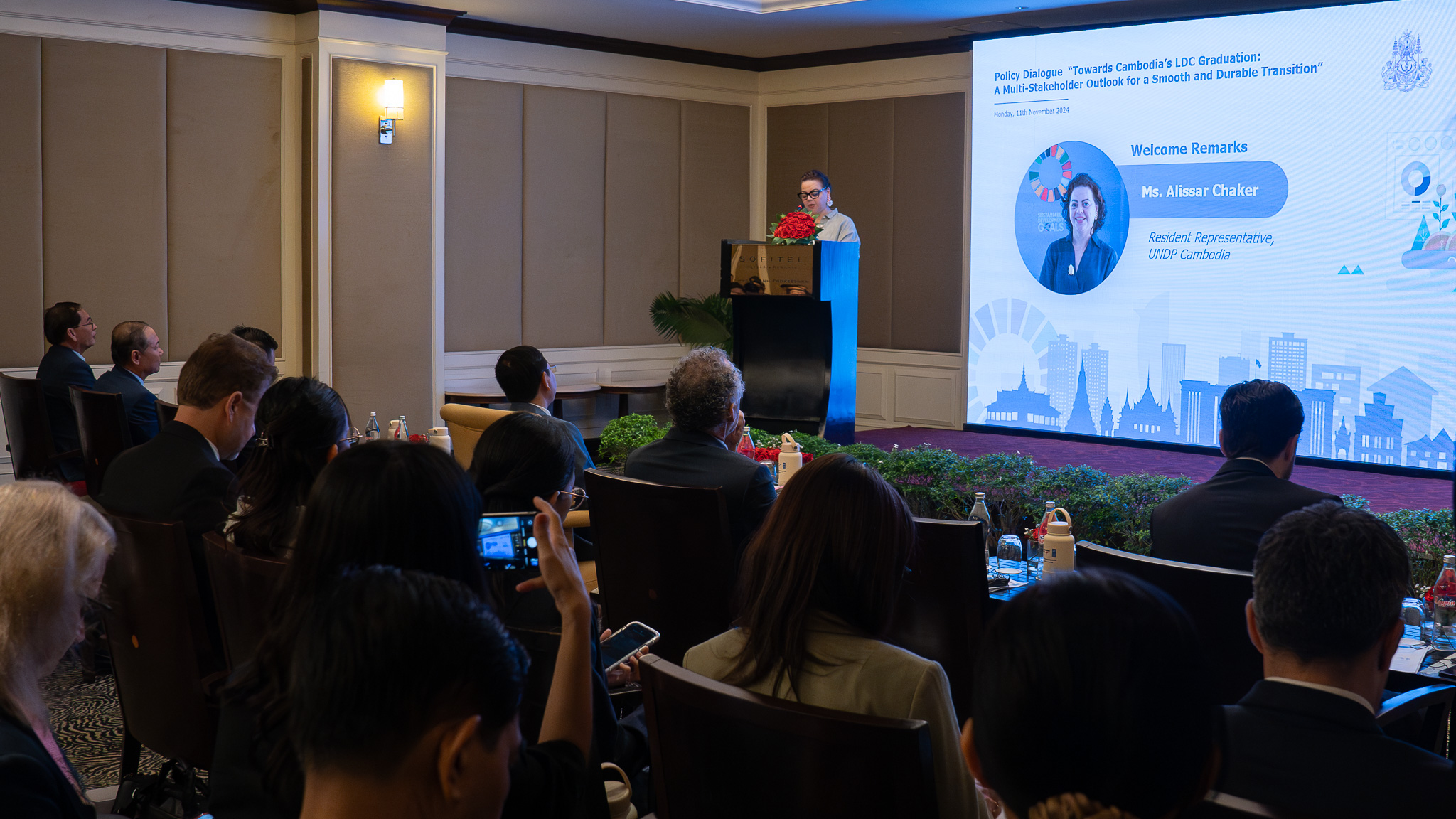Welcome Remarks by Ms. Alissar Chaker, Resident Representative, Undp Cambodia
Policy Dialogue “Towards Cambodia’s LDC Graduation: A Multi-Stakeholder Outlook for a Smooth and Durable Transition”
November 11, 2024

- Excellency Bin Troachhey, Minister of Planning and Chair of National Committee on LDC Graduation
- Mr. Andreas Zurbrugg, Head of Development Cooperation, Australian Embassy in Cambodia
- Representatives of the Royal Government of Cambodia, Development Partners, Civil Society and the Private Sector
- Esteemed UN colleagues
- Distinguished Speakers and Guests
- Ladies and Gentlemen.
Good morning, Chom reap sour!
It is my great pleasure to welcome you all to today’s Policy Dialogue “Towards Cambodia’s LDC Graduation: A Multi-Stakeholder Outlook for a Smooth and Durable Transition.” Today, we gather at an important juncture of Cambodia’s development, where sustainable development is not just a possibility but also an imperative.
UNDP is proud to support the Ministry of Planning in creating this platform for multi-stakeholder exchange, bringing together leaders, practitioners, and representative from sectoral ministries and public entities, development partners, civil society and the private sector to reflect on LDC graduation, its opportunities and challenges and the needed pathways and partnerships for a smooth transition towards a sustainable post-LDC future.
As a reminder, the Least Developed Countries (LDC) category was established by the United Nations General Assembly in 1971. It currently comprises forty-five nations, of which several are set to graduate soon. LDC Graduation is determined by three interconnected criteria: the per capita income, the Human Assets Index, and the Economic and Environmental Vulnerability Index. Cambodia's journey as a Least Developed Country (LDC) began in 1991. Since then, the country has been benefitting from international support measures (ISMs) in trade, financial and technical development cooperation, and participation in international forums.
Over the years, the country has made significant socio-economic progress, including strong economic growth, maintaining moderate inflation, accelerating poverty reduction, and human development - leading to substantial progress in achieving the graduation criteria. Cambodia first met the requirements for LDC graduation in 2021 and again exceeded all three criteria during the 2024 triennial review. In May 2024, the UN Economic and Social Council endorsed Cambodia's graduation from LDC status by 2029. This momentous milestone reflects Cambodia commitment to creating a more prosperous nation.
Excellencies, Ladies and Gentlemen,
LDC graduation might bring some challenges associated with the discontinuation of international support measures but also opportunities that can be harnessed by adopting a comprehensive approach to ensure a smooth and sustainable transition, opening new avenues for strong, inclusive, and resilient growth.
As part of its support to the Government in preparing for the LDC graduation, UNDP published two framework studies summarized in the policy brief that will be presented today “Cambodia’s Graduation from Least Developed Country (LDC) Status: Preparedness and Potential Economic and Social Impacts.” The brief is intended to launch the discussion on the impacts of the gradual loss of international support measures, such as Trade-Related Aspects of Intellectual Property Rights (TRIPS) waivers under WTO rules, preferential market access, and concessional financing, among others, since they could affect public health, key trade exports (ex. garments, milled rice, and bicycles), and reduce the overall economic growth if no preparedness actions are taken. The policy brief highlights that GDP growth may slow down between 0.5% to 1.5% with 165,000 potential job losses, particularly among women working in the garment sector. As a result, 432,000 people are at risk of falling into poverty if the right foundations are not laid as early as possible. consequently, Cambodia's progress towards its development ambition of reaching upper middle income and high income by 2030 and 2050, respectively, will be delayed or distorted.
Excellencies, Ladies and Gentlemen,
As we move forward, Cambodia would require sustained and high-quality growth. According to estimates by UNDP and CDRI, this will entail a growth rate exceeding 7% annually over the next 27 years. Nothing is impossible for Cambodia, but the country would also have to navigate global and regional uncertainties and multiple overlapping risks. These include human security threats (such as pandemics and climate change), challenges in aligning growth with job creation (including an aging population, the future of work, and high levels of informality), and hurdles to governance reforms and social cohesion. Together, these factors could make the path forward more complex and uncertain.
If risks are effectively managed, Cambodia could see several emerging benefits, including growth created by high-value-added industries, diversification of industrial and export markets, improved infrastructure and digital technology, enhanced human capital and skills, and a series of domestic reforms to strengthen the business environment. These opportunities are expected to drive increases in domestic private investment and strengthen both backward and forward linkages, as a result of stricter trade compliance.
Excellencies, Ladies and Gentlemen,
LDC graduation is a collective, all-of-society effort that extends beyond trade, necessitating the engagement of all development partners and social actors to fully harness its opportunities and re-brand the country. UNDP is committed to accompany Cambodia during its transition through supporting the acceleration of human development, enhancing competitiveness and economic diversification, promoting green economy and adaptation to climate change for resilient growth, and transitioning from funding to financing, as outlined in the UNDP’s Country Programme Document (2024-2028).
Our dialogue today aims to foster a shared understanding of the implications of LDC graduation and gather valuable insights from a multi-stakeholder perspective towards smooth and durable transition and a successful journey beyond LDC graduation. I am grateful to each one of you for joining us today. Your collaboration and shared expertise are vital.
Finally, let me take this opportunity to thank H.E. Bin Troachhey and his team for the leadership, clear vision and diligent coordination and follow-up.
I wish you all a fruitful and engaging discussion, and I look forward to an inspiring day ahead.
Thank you, Som Arkun!

 Locations
Locations


